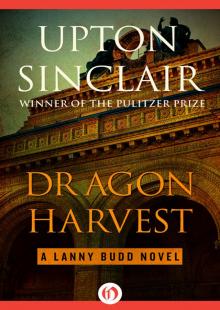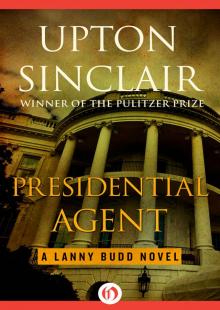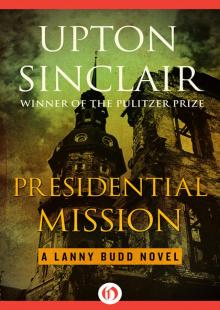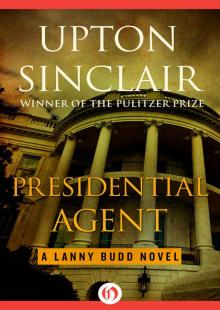- Home
- Upton Sinclair
Wide Is the Gate Page 20
Wide Is the Gate Read online
Page 20
II
While Irma was enjoying this high-class entertainment, her husband was looking at an art show, and afterward driving his car into a Berlin slum. Promptly at the stroke of twelve he passed the agreed-upon corner and picked up his “underground” friend. Spring was here and the day was bright. She had left her heavy coat at home and wore a gray cotton print, the most inconspicuous that could be found; her hair was parted straight back and covered by a black straw hat—in short, she was a poor workingwoman, with no non-sense about her, and in her arms she was carrying a paper bag.
“Is that what you have for me?” he asked, but she said: “No, just groceries. I was afraid to bring what I have until I was sure you were coming.”
“What is it?”
They were driving on a little-frequented street, but, even so, Trudi glanced about nervously and lowered her voice. “I have photostatic copies of confidential reports to the Wilhelmstrasse—that is the German Foreign Office—covering the details of our intrigues in various capitals; reports of our ambassadors and instructions to them.”
“Good Lord, Trudi!”
“It will not be so easy to make use of them this time, I fear, since they expose the double-dealing of other nations also, and England among them. I cannot imagine any but a Socialist paper being willing to publish them.”
“There’s one bourgeois paper, the Manchester Guardian, which has a reputation for publishing the truth regardless of whom it hurts.”
“Well, you will have to be the judge. You might give them to different papers, according to what they contain. For example, dispatches from our ambassador in Rome, telling the inside story of the deal between Mussolini and Laval. You know that Laval went to Rome at the beginning of the year and spent several days with Il Duce. Afterwards he gave the Chamber of Deputies the solemn assurance that he had made no concession imperiling the rights of Abyssinia.”
“I made note of his language,” said Lanny. “It was most explicit, but even so, I didn’t believe him.”
“He has made a ‘gentleman’s’ agreement, permitting Il Duce to take the country without the interference of France. What worries Mussolini is that while he’s tied up there, Hitler may take Austria; and so they have a mutual guarantee against this.”
“If we could prove that, Trudi, we’d blow the lid off the diplomatic teakettle.”
“Our ambassador states it categorically. Italy has already shipped thirty thousand troops through the Suez Canal, with complete equipment and supplies for a six months’ campaign. Operations will begin in the autumn, when the rainy season there is over.”
“What else have you in this magic box?”
“You have read about the decision of the Stresa Conference?”
“I was there five days ago.”
“All three of the powers have been secretly negotiating with the German Foreign Office behind one another’s backs—that is, they think it’s secretly.”
“But of course they all find out!”
“The real question is, what is going to be done at Geneva. The Wilhelmstrasse has the assurance that no overt action will be taken. Of course the Nazis don’t care about speeches—that gives Hitler a chance to make more speeches and to play upon the persecution complex of our people. A committee of the League will be appointed, but no one of the Big Three is prepared to demand any action to stop German rearmament. Sir John Simon is angling now for another invitation to Berlin to negotiate permission for German naval rearmament up to a fixed percentage of the British.”
“One of the newspaper men at Stresa told me that,” responded Lanny. “It means a complete sell-out of France!”
“The Nazi argument is that they are not arming against the French fleet, but against the Russian. The Soviets have some new submarines, and it is not in the British interest that they should get command of the Baltic.”
“There it is again!” exclaimed the American. “Everything goes back to their fear of the Reds. If they have to choose, they prefer Fascism every time.”
“There’s an intrigue going on between Mussolini and the British over the lake called Tsana, the source of the Blue Nile. Some day there will be a big dam, and the question is whether the waters shall flow to the Sudan or eastward to where Mussolini is going to settle his Fascist families. The British are willing to let Abyssinia go, provided they can have the lake and its headwaters; but Mussolini won’t give them enough, and it looks as if there’d be a showdown before the end of the year. The Wilhelmstrasse is happy over that, because it will mean that we can have the Anschluss with Austria, and perhaps close the Polish Corridor also. Goring is planning to travel to the Balkans next month to cement alliances there—our new trade routes lie that way, down the Danube with our machinery and munitions, and returning with wheat and oil and raw materials.”
III
So there was a diplomatic map of Europe, drawn by the cartographers of the Nazi Fuhrer. Lanny recalled his friend the young S.A. sports director, Hugo Behr, who had been shot in the face during the blood purge of less than a year ago. Hugo’s crime had been that he had taken seriously the second half of the label, National Socialist, and had urged that the party should attempt to carry out its promises to the little people of the Fatherland. In his last days on earth he had explained to Lanny how the course the Fuhrer was following would make him the prisoner of the Reichswehr, or rather of the Junker officers who controlled that highly disciplined fighting-force. “If he bases his program for re-employment entirely upon armaments, it means that sooner or later we shall have to fight, because that’s all you can do with guns and tanks.”
Here was the prophecy coming true. Anybody who was capable of thinking could see that the little people of the Fatherland were being led into another slaughter-pit. The trouble was, there were so few people anywhere in the world who could think or were willing to take the trouble; and in Germany so many of them had had their faces blown off, or were shut up in concentration camps, being made into physical and nervous wrecks. Lanny recalled a remark he had heard the Fuhrer make on the subject of the spiritual nature of man: “The greatest of spirits can be liquidated, if its bearer is beaten to death with a rubber truncheon.”
“You’re right about those documents, Trudi,” he said. “They are dynamite, and if they’re in a safe place I’d rather wait and get them when I’m ready to leave. My bags are likely to be opened at the hotel; and tonight I’m invited to visit Karinhall, which you must admit is hardly the safest place for them.”
“Unglaublich!” exclaimed the woman. “How do you manage such things?”
“It is simple. I have a bank draft for a large sum of money, enough to keep the fat General that way for many months to come. Incidentally, his staff officer has offered to show us the wedding-presents, the wonders of which have been broadcast to the world. Don’t you wish you could come along?”
“You make me believe in miracles—even if you cannot make me believe in spirits!”
“Oh, by the way, did you go to see that medium?”
“I did, and it was pathetic. She told me I was about to get a letter from a dark man.”
“Well, it might happen, in spite of all your doubts. You have decided that what I brought you was not a message from Ludi?”
“I have to give up thinking about it; it makes me too unhappy. I have enough problems in this present unhappy world.”
“I have had several more seances; but all I got was my grandfather Samuel Budd telling me to hearken to the Word of the Lord; or else the voice of Marcel, telling me that he is painting pictures of a wonderful new world—but his descriptions lack the clarity which characterized his brushwork on earth.”
They came back to the documents which Lanny was to carry out of Germany. He said: “I’ll do it once more, but after this we’ll have to arrange some other way. The Gestapo will be checking on everybody who comes and goes, and they’d be sure to make note if the publications coincide with my departures. And anyhow, I have to go to America for m
ost of the summer.”
Lanny didn’t give any hint of how he had handled the former job, nor did he ask Trudi what the repercussions in Berlin had been or whether any of her friends had got into trouble. She came to him out of the darkness, and he retired into another darkness; but where they met was a spotlight, and while they were in it they had to watch every step. They agreed that on the day after the morrow Trudi would come to the usual corner at three in the afternoon; that hour was better for Lanny, because by then he could have got his wife tired of looking at paintings and ready to keep some engagement. When the two conspirators saw each other they would not stop or speak; Trudi would go and get the documents, and half an hour later would meet him at a different corner and hand them to him; both of them would make sure they were not being followed, and Lanny would watch both times for the “all clear” signal. This having been agreed upon, he gave her the money he had brought for her, and then set her down in the neighborhood of an entrance to the Underground. It was the same place where he had once set Freddi Robin down for the last time and the recollection gave him a shiver of dread.
IV
Toward the latter part of the afternoon the huge baby-blue Mercedes limousine of the Minister-Prasident General called at the Hotel Adlon for the American couple and their bags. Wherever this vehicle came, the awe-stricken flunkies bowed low, and the reputation of the foreign guests was made forever after. The two favored ones were taken to the ministerial palace, where the Oberleutnant escorted them for the ceremony of viewing the gifts. Three large rooms had been set aside for the exhibition, and a dozen S.S. men in their black uniforms with silver braid and the skull and crossbones had been set to watch the treasures laid out on dozens of long tables. It was like a visit to Tiffany’s, or Gorham’s, only more so. Every sort of jewelry known to man, or to woman, and every design of gold and silver plate and utensil. Der Fuhrer had presented to his loyal friend one of the three existing portraits of Bismarck by Lenbach. The bridegroom had presented to his lady a transparent blue zircon of enormous proportions—everything in the way of jewels that one woman could carry, diadem, earrings, a bracelet, a ring, a necklace; the staff officer said it had cost thirty-six thousand marks, and he didn’t consider it necessary to lower his voice.
This was glory, this was success; a long way up the ladder of fame for a man who had started as a humble Reichswehr lieutenant with no special influence, and who had got stuck in the trenches at the outbreak of the World War. But even now the General was only at the beginning of his dizzy ascent—his whole manner told that to his guests; his step was firm and quick, his laughter exuberant, his handclasp somewhat crushing. He was clad in a white uniform with a pale-blue stripe that matched his car, and his orders and decorations made Lanny think of Tiffany’s again.
The bags had been moved into a second car, and with the General and his guests rode two of the older staff officers. Furtwaengler and another youngster followed in a second car, and the bags of all of them in a third. At Lanny’s feet was an object covered with a rug, and on the way he kept moving his feet over it; his expert knowledge told him that it was a submachine gun. He couldn’t be sure whether it was a Budd, but he knew that the firm had sold thousands of them to the Nazis for the street fighting with the Communists. Der dicke Hermann was taking no chances!
All the way the great man talked about airplanes, and aviation as the science of the future. He talked technicalities, because Lanny was an insider. He wanted to know how Budd-Erling was coming along, and Lanny, who had had a letter just before leaving, had no reason for withholding the fact that the frost was out of the ground in New England and the foundations due to be completed. In his boyhood he had learned the technical terms of ballistics, and in his recent talks with his father he had learned about wing loading and supercharging, increased compression ratios, anti-knock ratings, controllable pitch propellers. When he mentioned casually that Robbie had actually got an engine with a thousand horse power, the General demanded to see one right away. Lanny grinned and said: “It will please Robbie greatly to have you make the first approach.”
The head of the Prussian state had apparently not learned fear from his recent auto accident. They drove at high speed, with a long mournful horn warning other cars out of the way. It was dark when they arrived in the Schorfheide forests and all the visitors saw was a blaze of lights in the new palace, called a “hunting-lodge.” Lanny had seen a number of these constructions, in both the New World and the Old, so there was nothing novel to him in a great hall with a huge fireplace, a long banquet table, bearskins on the floor and heads of many kinds of antlered creatures on the walls. All you needed was a quarter of a million in any currency, and architects and interior decorators would turn you out such a job complete in three or four months; a good steward would get you a trained staff of servants in forester’s livery, or military or medieval or opera bouffe as preferred.
But not a Filmkonigin—no, that was something you had to go out and find for yourself, and it would cost you more. Emmy Sonnemann was built on generous lines, equipped to play Brunnehilde or any of the other Choosers of the Slain; in fact she had about reached the point where if she became any plumper it would be bouffe. But it would no longer matter, for it had been announced that she was going to make only one more stage appearance, and then would do her duty to the Fatherland and set an example to other German brides. She had abundant blond hair, bright blue eyes, placid features, and color which you couldn’t be sure about, since she might have brought her makeup artist with the rest of her wedding-cortege. Her manners were those of the stage, rather than of the aristocracy; she welcomed her guests with effusiveness, pressed food and drink upon them, called them by their first names, and afterward sat on the arm of her bridegroom’s chair and kissed him affectionately. Her first husband had been a leading Communist, and Lanny wondered what impression, if any, that had left upon her mind. He would have liked to be alone with her and try to find out.
She was obviously a kindly and somewhat naive person, and Irma liked her. Easy to see why audiences came to look at her on both stage and screen; also, why directors avoided giving her roles which called for the manifestation of intense passion. When the two guests were in their own room they carefully avoided expressing opinions, for the architect of Karinhall would hardly have failed to include wiring for espionage. However, when the two were lying in bed, Irma whispered, softly: “Oh, Lanny, that poor woman!”
“She seems to have got what she wants,” ventured the husband; to which the wife replied, still in whispers: “What do you suppose der Dicke weighs?”
V
In the course of two years of power the Minister-Prasident General had added a number of new titles to his list; besides being Reichsminister without Portfolio and Minister of Aviation and Chief of the German Air Force, Field Marshal and General of the Gestapo and President of the Reichstag and of the Prussian State Council, he was also Minister of Forestry and Master of the Hunt; which meant that it was a part of his role to be a country gentleman and have fine horses even though he rarely hoisted himself on top of one. Now he wanted to show his splendid estate to his guests, and it was a bore to them both, because Irma had been brought up on an estate and didn’t care a hang about it, and Lanny had had to entertain country gentlemen by looking at their estates ever since he had been a small boy and had really enjoyed it. Emmy went along, because she was a bride and it was her duty to follow her man and tell him that his possessions were the most wonderful in the world. Lanny and Irma assented meekly and didn’t dare look at each other for fear of revealing what was really in their minds. One feature of the place was a shrine to Karin, the owner’s former wife, and before this a candle was always kept burning.
Afterward the General governed Prussia over the telephone; as always when angry, he shouted as if he expected to be heard without a wire. Then he summoned Lanny to his study for a talk, and the playboy felt the cold blue eyes of the wholesale killer boring into him. For a matter of f
our or five years Lanny had been speculating about the possibility of telepathy, and now he was thinking: “Ach, du lieber Gott, suppose it should start working now!”
But it didn’t. This Hermann the Great was neither medium nor conjurer, but had to get his information by the ordinary objective method—hiring agents of very little competence, so he complained. If he could get valuable tips by social blandishments and a few smiles from his Filmkonigin, it would be a bargain. Apparently what he wanted was to be told about Stresa, and about the prospects at Geneva, where the League was now carrying on its solemn procedure of condemnation. Had Goring’s agents in Italy reported to him that Irma Barnes and her husband had been socially received by the English residents of Stresa, and introduced at a tea party to MacDonald and Simon? Anyhow, der Dicke would only have to listen for a while, and he would hear his art broker refer familiarly to the leading statesmen of all three of the Stresa allies.
Lanny had lain awake in the small hours of the morning, reflecting upon the peculiar problem confronting him. As before, he had to assume a pose of omniscience before the fat General and yet tell him nothing he didn’t already know. Also he had to use care not to employ too many of the facts which Trudi had told him. Some of them he couldn’t leave out, because they were the salient facts of the hour and had been told to him by others, also. But he must be careful not to assemble them in such a way that if the documents were ever published it would flash over Goring’s mind: “The very things that Lanny Budd revealed!”
VI
The art expert began with a summary of the situation which the cynical Pete had allowed him to read before it was put on the wire to New York. “My general impression is that you and the Fuhrer haven’t much to worry about in this case; you have got away with it, as we say in America. You got a slap on the wrist at Stresa, and you may get several more in the course of the year, but nobody is coming after you with a gun.”

 Prince Hagen
Prince Hagen Dragon Harvest
Dragon Harvest The Jungle
The Jungle Sylvia's Marriage
Sylvia's Marriage Oil! A Novel by Upton Sinclair
Oil! A Novel by Upton Sinclair The Coal War: A Novel
The Coal War: A Novel Presidential Agent
Presidential Agent World's End
World's End The Second-Story Man
The Second-Story Man O Shepherd, Speak!
O Shepherd, Speak! Wide Is the Gate
Wide Is the Gate The Return of Lanny Budd
The Return of Lanny Budd One Clear Call I
One Clear Call I 100%: the Story of a Patriot
100%: the Story of a Patriot The Machine
The Machine Presidential Mission
Presidential Mission A Cadet's Honor: Mark Mallory's Heroism
A Cadet's Honor: Mark Mallory's Heroism Between Two Worlds
Between Two Worlds World's End (The Lanny Budd Novels)
World's End (The Lanny Budd Novels) Between Two Worlds (The Lanny Budd Novels)
Between Two Worlds (The Lanny Budd Novels) The Coal War
The Coal War Presidential Agent (The Lanny Budd Novels)
Presidential Agent (The Lanny Budd Novels) Oil (filmed as There Will Be Blood)
Oil (filmed as There Will Be Blood) Wide Is the Gate (The Lanny Budd Novels)
Wide Is the Gate (The Lanny Budd Novels)